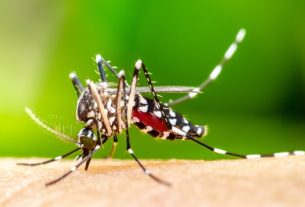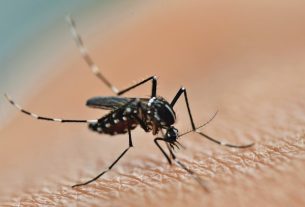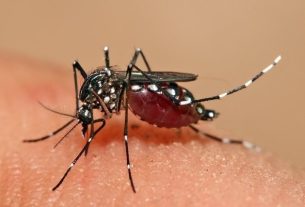Dengue fever in children is normally asymptomatic, but some children may experience high fever, irritability, drowsiness, red spots on the skin and lack of appetite, especially during times of disease epidemic, such as summer.
However, dengue fever is not always accompanied by easy-to-identify symptoms and can be confused with the flu, for example, which can cause the disease to be identified at a more advanced stage.
Therefore, the ideal is that whenever the child or baby presents a high fever and other signs that are different from usual, they should be evaluated by a pediatrician to identify the cause and initiate the most appropriate treatment, avoiding possible complications. Find out more about dengue.

Dengue symptoms in children
The main symptoms of dengue in children are:
- Apathy and drowsiness;
- Body ache;
- High fever, which starts suddenly and lasts between 2 and 7 days;
- Headache;
- Refusal to eat;
- Diarrhea or loose stools;
- Vomiting;
- Red spots on the skin, which generally appear after the 3rd day of fever.
A child with dengue may have no symptoms or symptoms very similar to those of the flu, which is why the disease often quickly progresses to a severe stage without being identified. In the initial phase of dengue there are no respiratory symptoms, however what often makes parents confuse dengue with the flu is fever, which can happen in both cases.
Read too: Top 10 flu symptoms (and how to alleviate them)
In children under 2 years of age, symptoms such as headache and muscle pain can be identified by persistent crying and irritability.
Online symptom test
Select the symptoms that the child presents in the following test to check the risk of dengue fever:
The symptom test is only a guidance tool and does not serve as a diagnosis or replace a consultation with a pediatrician.
Warning signs in children
The warning signs correspond to signs of dengue complications in children and appear between the 3rd and 7th day of the disease, when the fever subsides, the main ones being:
- Frequent vomiting;
- Intense abdominal pain that does not go away;
- Dizziness or fainting;
- Difficulty breathing;
- Nose or gum bleeding;
- Temperature lower than 35°C.
In general, dengue fever in children worsens quickly and the appearance of these signs is a warning of the onset of the most serious form of the disease. Therefore, the pediatrician should be consulted as soon as the first symptoms appear, so that the disease can be identified before it becomes severe.
Make an appointment with the nearest pediatrician to investigate the cause of your child’s symptoms and thus begin the best treatment:
Taking care of your health has never been easier!
How to confirm the diagnosis
The diagnosis of dengue is made through a blood test to assess the presence of the virus. However, the results of this test take a few days and, therefore, it is common for the doctor to start treatment even when the result is not known.
Read too: How to know if it is dengue: diagnostic tests and exams
Why a child can have dengue more than once
Everyone, children and adults, can get dengue again, even if they have had the disease before. As there are 4 different viruses for dengue, a person who has contracted dengue once is immune only to that virus, and can also contract 3 different types of dengue.
Furthermore, it is common for people who have already had dengue to develop dengue hemorrhagic fever, and therefore care to prevent the disease must be maintained. Learn how to make a homemade repellent to prevent dengue.
How the treatment is carried out
Dengue treatment begins as soon as symptoms are identified, even without confirmation of the diagnosis through a blood test. The type of treatment that will be used depends on the severity of the disease, and only in the mildest cases can the child be treated at home. In general, treatment includes:
- Fluid intake;
- Serum through the vein;
- Medicines to control symptoms of fever, pain and vomiting.
In the most serious cases, the child needs to be admitted to the ICU. Dengue usually lasts about 10 days, but full recovery can take 2 to 4 weeks.
Bibliography
- BRAZILIAN SOCIETY OF PEDIATRICS. What adults need to know about dengue in children. Available at: <https://www.sbp.com.br/especiais/pediatria-para-familias/doencas/dengue/>. Accessed on April 1, 2020
- HEALTH BLOG – MINISTRY OF HEALTH. Dengue symptoms in children can be confused with flu or viruses. Available at: <http://www.blog.saude.gov.br/index.php/promocao-da-saude/32200-sintomas-de-dengue-em-criancas-podem-ser-confundidos-com-gripe- ou-virus>. Accessed on September 30, 2019
- MINISTRY OF HEALTH. Dengue: symptoms, causes, treatment and prevention. Available at: <http://www.saude.gov.br/saude-de-az/dengue>. Accessed on September 30, 2019
- BRAZILIAN SOCIETY OF PEDIATRICS. Dengue. Available at: <https://www.sbp.com.br/especiais/pediatria-para-familias/doencas/dengue/>. Accessed on September 30, 2019

Sign up for our newsletter and stay up to date with exclusive news
that can transform your routine!
Warning: Undefined array key "title" in /home/storelat/public_html/wp-content/plugins/link-whisper-premium/templates/frontend/related-posts.php on line 12
Warning: Undefined array key "title_tag" in /home/storelat/public_html/wp-content/plugins/link-whisper-premium/templates/frontend/related-posts.php on line 13



